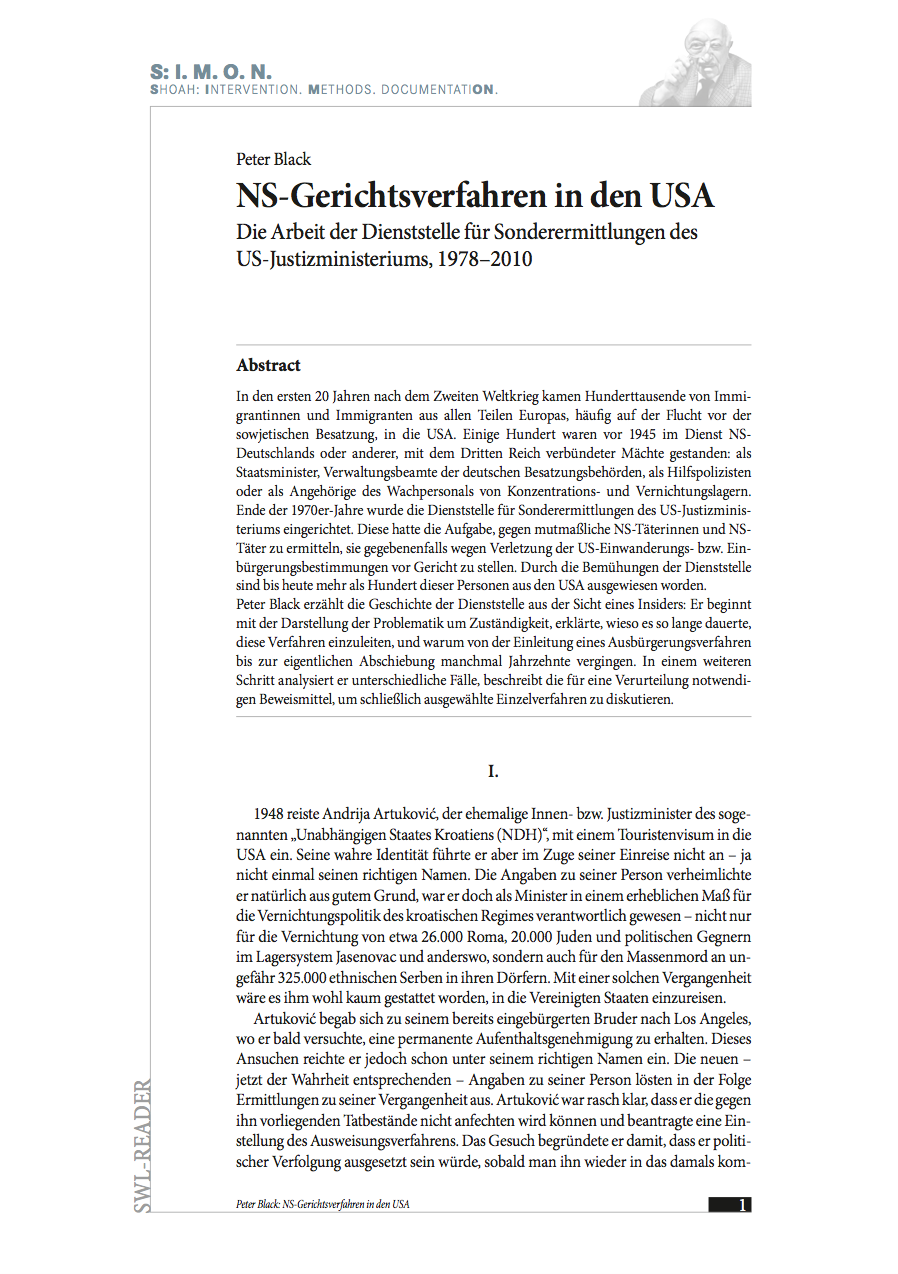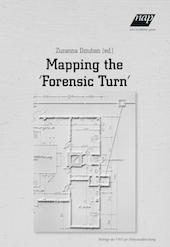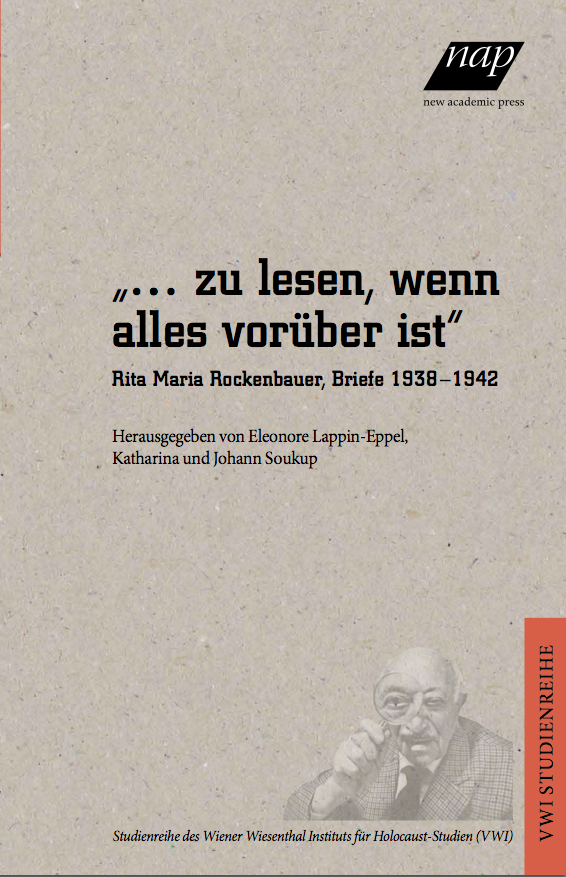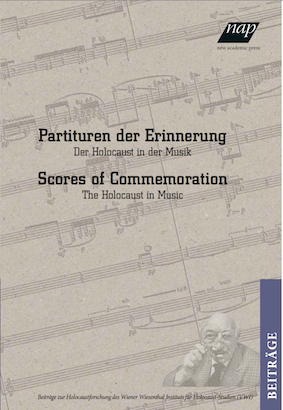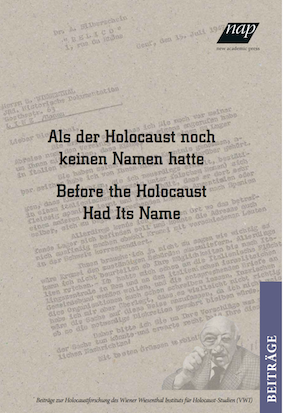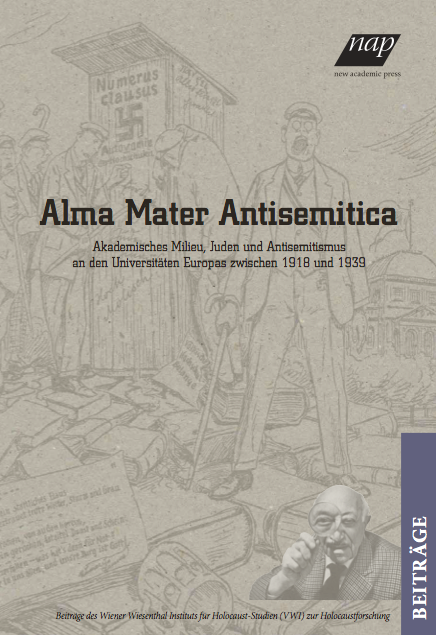 After examining thousands of letters written between 1940 and 1944 by Polish Jews in ghettos on the verge of starvation, the author approached a visual artist to assist with processing the emotional aspect of the letters. The goal was to reflect the voices of their senders and addressees. Between October 2008 and spring 2010, two sample letters, reproduced from originals in the archive, were sent together with an explanatory letter to 3,000 randomly selected Varsovians. The Hunger Letters Project, the ‘letter in a bottle’, had repercussions that exceeded all expectations. Finally, the specific understanding of this public intervention is elaborated upon in the context of its ethnographic results.
After examining thousands of letters written between 1940 and 1944 by Polish Jews in ghettos on the verge of starvation, the author approached a visual artist to assist with processing the emotional aspect of the letters. The goal was to reflect the voices of their senders and addressees. Between October 2008 and spring 2010, two sample letters, reproduced from originals in the archive, were sent together with an explanatory letter to 3,000 randomly selected Varsovians. The Hunger Letters Project, the ‘letter in a bottle’, had repercussions that exceeded all expectations. Finally, the specific understanding of this public intervention is elaborated upon in the context of its ethnographic results.
Editorial
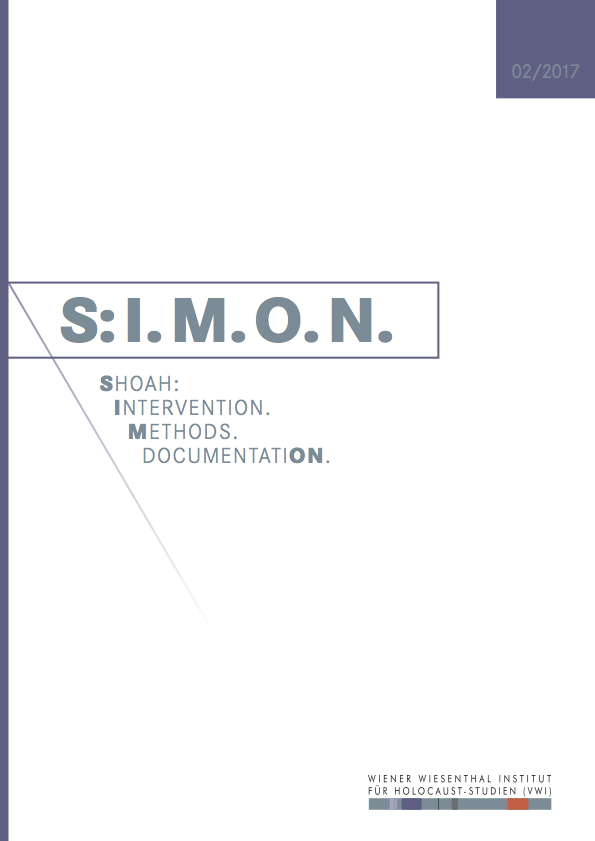 S:I.M.O.N. is an e-journal of the Vienna Wiesenthal Institute for Holocaust Studies (VWI). It appears twice a year in English and German language. S:I.M.O.N. aims at both a transnational and comparative history of the Holocaust and Jewish Studies in Central and Eastern Europe within the broader contexts of the European history of the 20th and 21st century, including its prehistory, consequences and legacies as well as the history of memory.
S:I.M.O.N. is an e-journal of the Vienna Wiesenthal Institute for Holocaust Studies (VWI). It appears twice a year in English and German language. S:I.M.O.N. aims at both a transnational and comparative history of the Holocaust and Jewish Studies in Central and Eastern Europe within the broader contexts of the European history of the 20th and 21st century, including its prehistory, consequences and legacies as well as the history of memory.
S:I.M.O.N. serves as a forum for discussion of various methodological approaches. The journal especially wishes to strengthen the exchange between researchers from different scientific communities and to integrate both the Jewish history and the history of the Holocaust into the different “national” narratives. It also lays a special emphasis on memory studies and the analysis of politics of memory. S:I.M.O.N. uses a double-blind review system, which means that both the reviewer’s and the author’s identities are concealed from each other hroughout the review process.
Shoah: The journal deals with the history of the Shoah from multidisciplinary, transnational and comparative perspectives. It seeks to integrate studies on Jews as well as on other groups of victims of the Holocaust, especially on Roma, and of so far less researched regions of (East) Central and (South) Eastern Europe.
Intervention. The journal reports on research projects and their transmission into public events. It also informs about current educational and remembrance programs.
Methods. The journal serves as a forum for the discussion of methodological approaches as, for instance, the everyday history, oral history, gender history, the history of violence, anti-Semitism and racism and the theory of memory and memory politics.
DocumentatiON. The journal contributes to critical approaches on using and interpreting archival materials in the 21st century.
Download the current issue S:I.M.O.N. 2017/2.
Articles
Zoltán Tibori Szabó
Frühe Werke der Erinnerung an den Holocaust in Siebenbürgen
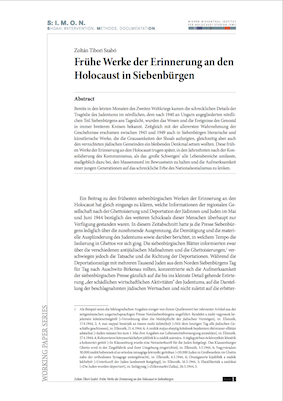 The terrible details of the tragedy of Jewry in the northern part of Transylvania, which had been annexed to Hungary after 1940, emerged even in the last months of the Second World War, when the essence and events of the genocide were known in ever wider circles. As awareness of the events first emerged, literary and artistic works were also published in Transylvania between 1945 and 1949 that depicted the cruelties of the Shoah and at the same time aimed to raise a lasting monument for the Jewish communities that had been destroyed. These early works of Holocaust remembrance made a considerable contribution to retaining the mass murder in people's consciousness and turning a young generation's awareness to the terrible heritage of Nazism later on, when, during the decades of consolidation of communism, all spheres of life were submerged in a “great silence”.
The terrible details of the tragedy of Jewry in the northern part of Transylvania, which had been annexed to Hungary after 1940, emerged even in the last months of the Second World War, when the essence and events of the genocide were known in ever wider circles. As awareness of the events first emerged, literary and artistic works were also published in Transylvania between 1945 and 1949 that depicted the cruelties of the Shoah and at the same time aimed to raise a lasting monument for the Jewish communities that had been destroyed. These early works of Holocaust remembrance made a considerable contribution to retaining the mass murder in people's consciousness and turning a young generation's awareness to the terrible heritage of Nazism later on, when, during the decades of consolidation of communism, all spheres of life were submerged in a “great silence”.
SWL-Reader
During the first two decades following the Second World War, hundreds of thousands of migrants arrived in the United States of America from all parts of Europe, many of them having fled the Soviet occupation. Several hundred had been in service to Nazi Germany or other powers in league with the Third Reich before 1945: as state ministers, administrative officers of the German occupational forces, adjunct policemen or as guards at the concentration camps and extermination camps. In the late 1970s, the US Department of Justice established an Office for Special Investigations. It was their task to investigate alleged Nazi perpetrators, and, if applicable, to prosecute them for violation of the US immigration and naturalization laws. Their efforts resulted in the deportation from the United States of America of more than a hundred of these persons.
Peter Black recounted the story of this office from an insider's point of view. Beginning with an explanation of the problem of competence, he explained why it took so long for these cases to be initiated, and how it was possible that decades passed between the initiation of a deportation case and the actual deportation. He then went on to analyse a range of cases, described the required evidence and finally presented a discussion of selected individual cases.
Events
Miloslav Szabó
Ein ‚antislowakischer' Oscar-Film? Zur Darstellung des Holocaust im tschechoslowakischen Film Obchod na korze
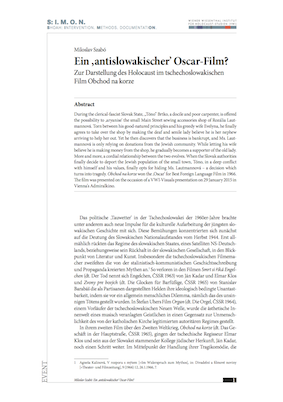 During the clerical-fascist Slovak State, "Tóno" Brtko, a docile and poor carpenter, is offered the possibility to 'aryanise' the small Main Street sewing accessories shop of Rozália Lautmannová. Torn between his good-natured principles and his greedy wife Evelyna, he finally agrees to take over the shop by making the deaf and senile lady believe he is her nephew arriving to help her out. Yet he then discovers that the business is bankrupt, and Ms. Lautmannová is only relying on donations from the Jewish community. While letting his wife believe he is making money from the shop, he gradually becomes a supporter of the old lady. More and more, a cordial relationship between the two evolves. When the Slovak authorities finally decide to deport the Jewish population of the small town, Tóno, in a deep conflict with himself and his values, finally opts for hiding Ms. Lautmannová – a decision which turns into tragedy. Obchod na korze won the 'Oscar' for Best Foreign Language Film in 1966. The film was presented on the occasion of a VWI-Visuals presentation on 29 January 2015 in Vienna's Admiralkino.
During the clerical-fascist Slovak State, "Tóno" Brtko, a docile and poor carpenter, is offered the possibility to 'aryanise' the small Main Street sewing accessories shop of Rozália Lautmannová. Torn between his good-natured principles and his greedy wife Evelyna, he finally agrees to take over the shop by making the deaf and senile lady believe he is her nephew arriving to help her out. Yet he then discovers that the business is bankrupt, and Ms. Lautmannová is only relying on donations from the Jewish community. While letting his wife believe he is making money from the shop, he gradually becomes a supporter of the old lady. More and more, a cordial relationship between the two evolves. When the Slovak authorities finally decide to deport the Jewish population of the small town, Tóno, in a deep conflict with himself and his values, finally opts for hiding Ms. Lautmannová – a decision which turns into tragedy. Obchod na korze won the 'Oscar' for Best Foreign Language Film in 1966. The film was presented on the occasion of a VWI-Visuals presentation on 29 January 2015 in Vienna's Admiralkino.
Joanna Tokarska-Bakir: The Hunger Letters. Between the Lack and Excess of Memory
„... zu lesen, wenn alles vorüber ist“
Rita Maria Rockenbauer, Briefe 1938 –1942
Wien 2014
Partituren der Erinnerung.
Der Holocaust in der Musik
Scores of Commemoration.
The Holocaust in Music
Wien 2015
Before the Holocaust Had Its Name. Early Confrontations of the Nazi Mass Murder of the Jews
Wien 2016
Akademisches Milieu, Juden und Antisemitismus an den Universitäten Europas zwischen 1918 und 1939
Academic Milieu, Jews and Antisemitism at European Universities between 1918 and 1939
Wien 2016


